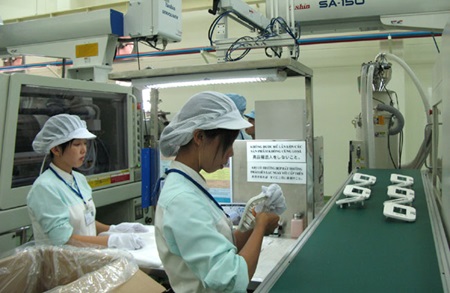Government pushes for reforms to improve business environment
 |
| Employees work on blood pressure meters on a production line at the foreign-invested Key Plastics Co,Ltd. in the southern province of Binh Duong. Viet Nam is focusing on improving its business environment for the next two years. VNA/VNS Photo Duong Chi Tuong |
Key areas of a Government resolution released yesterday include pushing for reforms to reduce time-consuming and wasteful administrative procedures, enhancing governmental offices' transparency and accountability, and adopting regulations that are in accordance with international rules.
Another high priority is raising the country's business environment indicator to higher than the ASEAN average.
In addition, the Government will also strive to reduce its average tax-filing time to 121.5 hours per year (from 872 hours in 2013 and 537 hours in 2014) and raise the number of businesses that complete online tax applications to 95 per cent.
Advancements in science and technology would help with the restructuring of the agriculture sector, according to the resolution. The sector must also enhance product quality and competitiveness, while ensuring food security and sustainable development.
The Government also made other superior value-adding industries like tourism, finance and telecommunications priorities in the national development programme.
More State-own enterprises would be restructured. The Government aims to adapt them according to the principles of the market economy. But preferential policies would also be created to stimulate private growth.
Special policies and mechanisms would also be established to level the playing field between large State-owned enterprises and small-to-medium-sized enterprises. Firms would also be encouraged to pour more capital into research and development.
Ministries, sectors, cities and provinces were ordered to take steps to improve their investment and business environments, and resolve any impediments in the implementation of administrative procedures.
The new resolution also recommended the privatisation of a number of public services. It advocated for giving key sectors such as education, health care and technology more autonomy.
The Government was to run a pilot programme to test a number of projects, using the public-social partnership approach.
What the stars mean:
★ Poor ★ ★ Promising ★★★ Good ★★★★ Very good ★★★★★ Exceptional
Latest News
More News
- NAB Innovation Centre underscores Vietnam’s appeal for tech investment (January 30, 2026 | 11:16)
- Vietnam moves towards market-based fuel management with E10 rollout (January 30, 2026 | 11:10)
- Vietnam startup funding enters a period of capital reset (January 30, 2026 | 11:06)
- Vietnam strengthens public debt management with World Bank and IMF (January 30, 2026 | 11:00)
- PM inspects APEC 2027 project progress in An Giang province (January 29, 2026 | 09:00)
- Vietnam among the world’s top 15 trading nations (January 28, 2026 | 17:12)
- Vietnam accelerates preparations for arbitration centre linked to new financial hub (January 28, 2026 | 17:09)
- Vietnam's IPO market on recovery trajectory (January 28, 2026 | 17:04)
- Digital economy takes centre stage in Vietnam’s new growth model (January 28, 2026 | 11:43)
- EU Council president to visit Vietnam amid partnership upgrade (January 28, 2026 | 11:00)
















 Mobile Version
Mobile Version